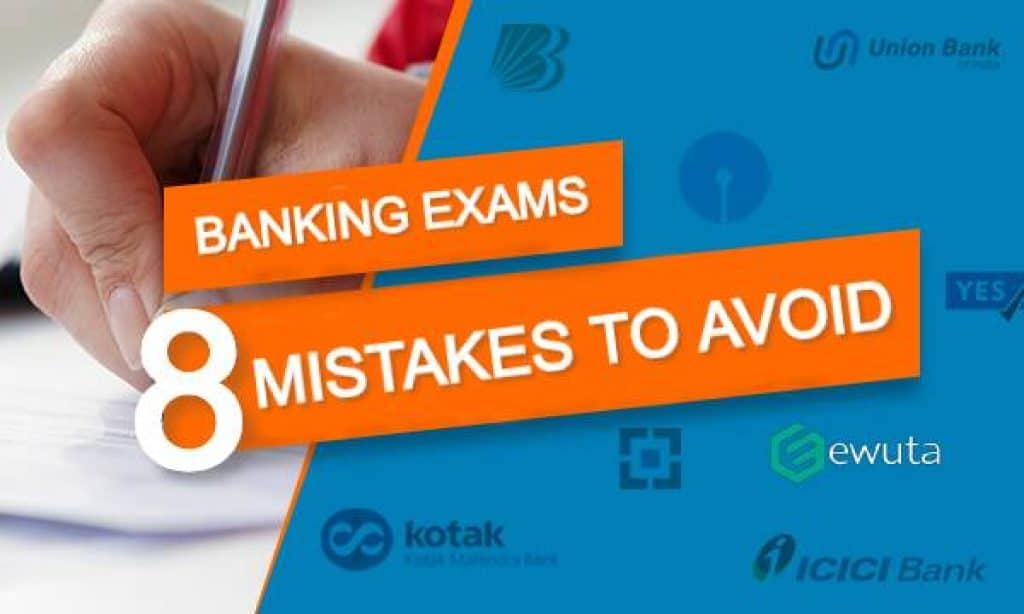Every year, sincere students work extremely hard to crack banking exams to secure a government job in one of the many renowned banking institutions. Banking exams such as SBI PO, SBI Clerk, IBPS Clerk, RBI Assistant, NABARD Grade B and so on, are conducted every year, offering students ample opportunities to bag a secure banking job with a decent salary and various perks, and candidates are expected to be ready when application procedure commences.

For instance, IBPS Clerk Application form appears around August-September, followed by the usual application procedure and selection process.
While some succeed in getting shortlisted and getting through the arduous selection process, others fail to do so. At times, even the most studious and hardworking aspirants commit errors, not citing loopholes in their preparation strategy, and thereby, fall short of the stipulated cutoff.
On that note, let’s discuss some of the common mistakes that you Should Avoid While Preparing for Banking Exams.
Banking Exams 8 Common Mistakes to Avoid
1. Not Attempting Mock Tests Regularly:
The most common mistake that a banking aspirant makes is that of not attempting regular mock tests of the relevant exam, along with its detailed analysis.
Taking a mock test enables you to keep a check on your speed and accuracy, providing you a summary of your performance and highlighting your strengths and weaknesses at the same time.
This gives you an idea of the areas that need to be worked upon, to convert them into strengths.
2. Lack of Consistency:
Aspirants startv their preparation with a vigour, but sooner or later, succumb to distractions and stop being consistent in their preparation. They skip in and out of their regular study schedules.
This ends up being a key deterrent to the candidates’ success, and they fail to capitalise over their efforts.
3. Preparing for Multiple Exams:
If candidates start preparing for exams like SSC, RRB, along with bank exams, they end up falling short of their goals. Preparing for multiple exams is a recipe for disaster. Assuming that most of the syllabus is similar, aspirants set out on their preparation voyage with either of their feet on two different boats, only to end up drowning.
This is a major ignorant mistake that many deserving aspirants commit year in and year out, disregarding the fact that different exams have contrasting differences in exam pattern, degree of toughness, syllabus differences, and require different levels of strategy.
This being said, banking aspirants should narrow his/her focus and preparation towards banking exams solely. While he/she can appear for multiple upcoming exams to get over exam fear, it is advisable not to overdo this.
4. Starting Mains Preparation, After Prelims Result:
Generally, there is a gap of just one month between the prelims and mains which is too slim to cover the vast and advanced syllabus of the Mains exam. It is imperative to start preparing for Mains right from the get go.
5. Lousy Time Management:
Allocating the right amount of time to different sections is a way to ace any exam. It is necessary to identify sections that you are weak in and give extra time to them.
It is said that a maximum of six to seven hours of daily study is enough to crack any banking exam, but it is necessary that these hours be put to the best of use with full concentration.
It is a well-known fact that our brain is most active during the early morning hours, and this is the apt time of the day to go through general/current affairs and also for rules in grammars as well as comprehensive reading.
6. Not Taking Enough Rest:
This happens quite often when there are only a few weeks left before the exam date. Candidates trim their resting time and study till late night. This practise is not healthy and can affect your cognitive thinking.
At Least eight hours of sleep is a must to keep you mentally and emotionally fit for smooth preparation.
7. Lacking Grip of Fundamental Concepts:
Using short tricks to solve questions of a particular topic without knowing the basic concepts of that topic is no doubt a bad strategy. It might get you through Prelims, but will backfire in the Mains exam, where most of the questions are concept-based.
So, on that note, make sure to have sound knowledge of basic concepts, but also stay in touch with short tricks as they save considerable amounts of time.
8. Continuously Switching Knowledge Sources:
Students end up wasting too much time in deciding which source of stud material is credible and which is not. Surfing the internet, watching videos, students get stressed and confused.
He/She should make sure that the content that is being received is reliable and up-to-date.



